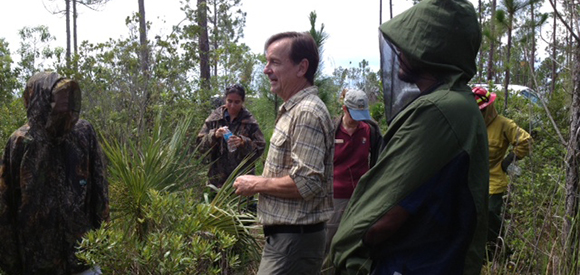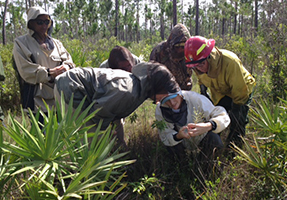This symposium reinforces innovative ways for us to collaborate to manage fuels, balance fire ecology, and address wildfire response in pinelands both within Everglades National Park and in pineland fragments within urban Miami and the Florida Keys. Rick Anderson, NPS fire management officer

2014 Pine Rockland Symposium

Everglades National Park co-hosted the 2014 Pine Rockland Symposium June 26th–28th, 2014. The three-day conference included presentations and field sessions in Everglades National Park, Key Deer National Wildlife Refuge, and Miami-Dade County preserves. Participants discussed ways to “maintain and restore pine rockland communities, their associated species, and the natural processes, most notably fire,” upon which they rely.
Everglades fire staff donned bug jackets and took participants to one of the largest tracts, 20,000 acres of the critically imperiled pine rockland ecosystem in South Florida, within Everglades National Park. Composed predominantly of Florida slash pine, Pinus elliottii var. densa, the pine rockland community in Everglades National Park has a diverse understory of both temperate and tropical plants, many of which are endemic or only found in pine rocklands. Everglades’ pine rocklands depend on fire to provide healthy habitat for multiple threatened and endangered species including two rare butterflies, the Bartram’s hairstreak and Florida leafwing, soon to be federally listed as endangered.
Symposium participants visited the Hole in the Donut (HID) Central prescribed burn unit with fire staff to discuss fire behavior and ecology of the pinelands. “This symposium reinforces innovative ways for us to collaborate with one another to manage fuels, balance fire ecology, and address wildfire response in pinelands both within Everglades National Park and in pineland fragments within urban Miami and the Florida Keys,” said Rick Anderson, fire management officer. The HID prescribed burn was completed by Everglades National Park and Florida Forest Service staff working in partnership in April 2014.
The first agency-approved prescribed burn in National Park Service history took place in the pinelands in Everglades National Park in 1958. Similarly, current prescribed burns of pine rocklands are intended to address changes in the vegetation due to fire exclusion. The continuation of fuels treatment through prescribed burning is aimed at maintaining diversity in the pinelands, reducing the risk posed by future wildfires, and providing a safer environment for firefighters to manage wildfires in the future.
This year’s Pine Rockland Symposium “was a huge success because it brought together so many different groups from our community and allowed us to continue our collaboration. We are continually working to learn from each other about this critically endangered ecosystem,” said Maya Tupaj, Everglades National Park Fire ecologist.
The Pine Rocklands Symposium welcomed attendees representing local, state, and government agencies, the Bahamas and Turks and Caicos Islands, and private landowners interested in pine rockland management and conservation efforts. The diverse group also included members of the National Park Service, US Geological Survey, US Fish and Wildlife Service, Miami-Dade County Natural Areas Management and Environmentally Endangered Lands, The Nature Conservancy, Fairchild Tropical Botanical Garden, Florida International University, University of Florida, Tropical Audubon Society, Florida Forest Service, Zoo Miami, the Institute for Regional Conservation, the Bahamas and Turks and Caicos Islands, private landowners, and many more.
Read more information on pine rocklands.
Read information on pine rocklands for kids.
Contact: Rick Anderson, fire management officer
Email: Rick_Anderson@nps.gov
Phone: (305) 242-7853
Tags
- wildland fire
- cohesive strategy
- maintain and restore resilient landscapes
- fire adapted communities
- response to wildfire
- fy2014
- prescribed fire
- endangered species
- habitat restoration
- wildlife management
- natural resource management
- fuel reduction
- partnerships
- education
- outreach
- ser
- southeast
- florida
- everglades national park
Last updated: December 15, 2016
